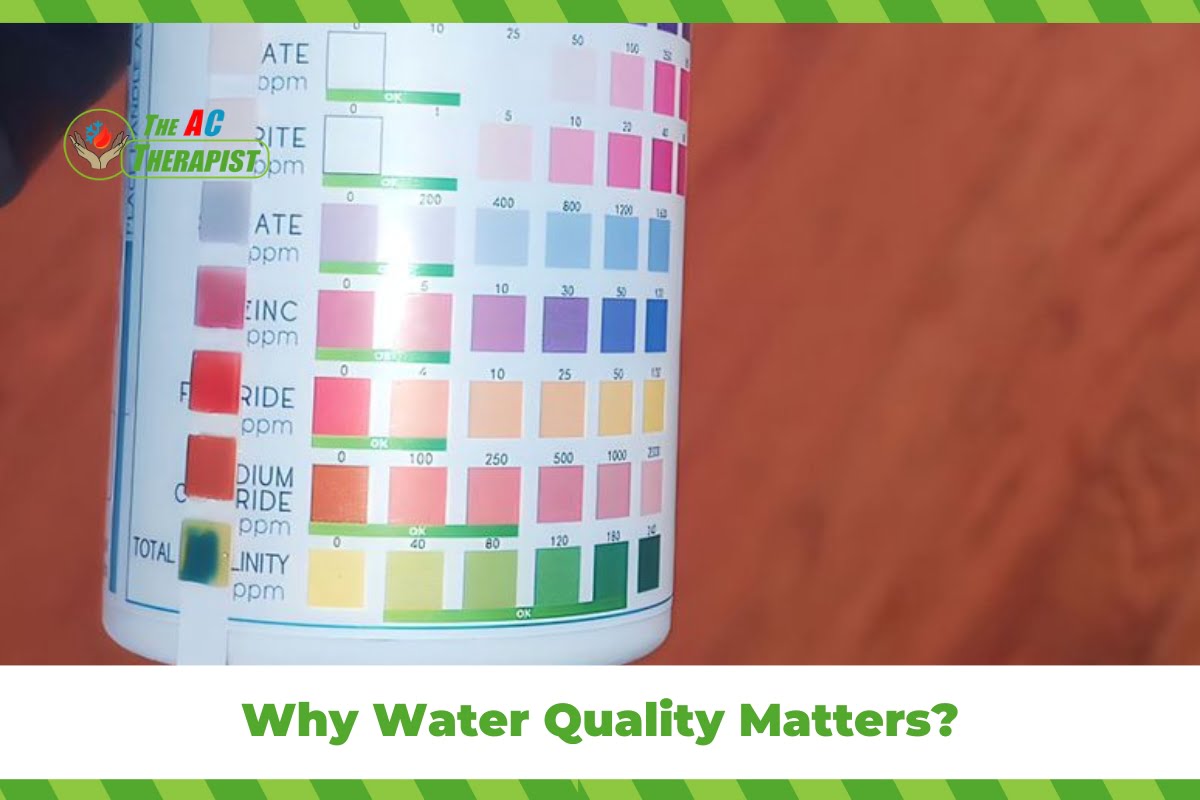Why Water Quality Matters?
Water is the lifeblood of our homes, and its quality is paramount to the health and well-being of our families. Whether you’re sipping a glass of water from the tap, taking a shower, or doing laundry, you rely on the quality of your water supply. In this comprehensive guide brought to you by Plumbing Therapist, the sibling company of The AC Therapist, we will delve deep into the world of water quality. From understanding the importance of clean water to identifying common issues and solutions, we’re here to empower homeowners like you to take control of your water quality.
The Significance of Water Quality
Water is a fundamental element of our daily lives, and its quality holds immense significance. This blog explores why water quality matters and sheds light on the pivotal role plumbing plays in maintaining it.
Why Water Quality Matters?
Clean water isn’t just a luxury; it’s a necessity for human health. Contaminants in water can lead to serious health issues. Access to safe drinking water is essential for hydration, cooking, and maintaining overall well-being. Poor water quality can result in illnesses and decreased quality of life.
Water quality matters not only for drinking but also for other household uses like bathing, laundry, and cleaning. Quality water improves the performance and longevity of appliances and plumbing systems, saving you money in the long run.
The Role of Plumbing in Water Quality
Plumbing is the lifeline of your home’s water supply. It’s responsible for transporting water from its source to various points of use. Maintaining clean water quality requires a plumbing system that’s free from contaminants and damage.
Old or corroded pipes can introduce impurities into your water. Plumbing also includes fixtures and appliances like faucets, showers, and water heaters. Any issues with these components can affect water quality. Regular maintenance and timely repairs are essential to ensure that your plumbing system doesn’t compromise the purity of your water.
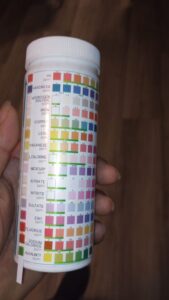
What are the 3 types of water quality?
Water quality can be broadly categorized into three primary types based on different aspects of evaluation and concerns:
Physical Water Quality:
Physical water quality refers to the characteristics of water that can be observed without chemical analysis. These characteristics include:
- Turbidity: The cloudiness or haziness of water caused by suspended particles.
- Temperature: The degree of hotness or coldness of water, which can influence its suitability for aquatic life and various human activities.
- Color: The hue of water, which can be influenced by natural factors (e.g., dissolved organic matter) or contaminants.
- Odor: The scent or smell of water, which can be affected by the presence of certain chemicals or organic matter.
- Taste: The flavor of water, which can be influenced by minerals, chemicals, or natural substances.
- Clarity: The clearness or transparency of water, indicating its purity.
Chemical Water Quality:
Chemical water quality pertains to the composition of water in terms of its chemical constituents. This includes the presence and concentration of various substances, such as:
- Dissolved Solids: The concentration of minerals, salts, and other dissolved substances in water.
- pH Level: The measure of water’s acidity or alkalinity, which can affect its corrosiveness and suitability for different uses.
- Nutrients: The levels of nutrients like nitrogen and phosphorus, which can impact water quality and aquatic ecosystems.
- Heavy Metals: The presence of potentially harmful metals like lead, arsenic, and mercury.
- Chlorine and Chloramines: Disinfectants added to drinking water to kill bacteria and pathogens.
- Pesticides and Herbicides: Chemicals used in agriculture that can find their way into water sources.
- Industrial Chemicals: Chemical pollutants from industrial processes that may contaminate water.
Biological Water Quality:
Biological water quality focuses on the living organisms and microorganisms in water and their impact on water quality. Key aspects include:
- Microbial Contamination: The presence of bacteria, viruses, and other microorganisms that can pose health risks.
- Aquatic Life: The health and diversity of aquatic ecosystems, including fish, insects, and other organisms, as indicators of water quality.
- Algae and Plankton: The presence of harmful algal blooms or excessive plankton populations, can disrupt aquatic ecosystems and water quality.
- Biomonitoring: The use of biological indicators to assess water quality, such as the presence or absence of specific species or the health of aquatic communities.
Each of these types of water quality is crucial for assessing and managing water resources to ensure they are safe, clean, and suitable for various uses, including drinking, agriculture, industrial processes, and recreational activities.
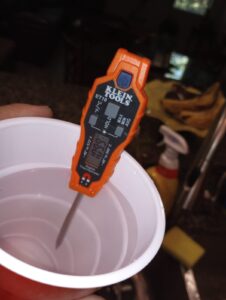
Common Water Quality Issues
Water quality problems can affect the well-being of your home and family. This section highlights four common issues:
1. Sediment and Particles
Have you ever noticed your water looking cloudy or filled with tiny particles? Sediment and particles in your water can be quite an annoyance. They can impact the taste, smell, and even the clarity of your water. Plus, they love to clog up your plumbing fixtures and appliances. We’ll show you how to get rid of these pesky intruders.
2. Hard Water
Ah, hard water—a familiar foe for many homeowners. It’s packed with minerals like calcium and magnesium, and it can wreak havoc on your plumbing fixtures and appliances. Those mineral deposits, known as limescale, can be a real headache. We’ll help you spot the signs of hard water and equip you with effective solutions to fight it.
3. Chlorine and Chloramines
Chlorine and chloramines are used to keep our drinking water safe, but they can also bring some unwanted baggage—odd tastes and smells. Who wants to sip water that smells like a swimming pool? Not us! We’ll share tips on how to tackle these chemical culprits, ensuring your water tastes and smells as fresh as it should.
4. Bacteria and Contaminants
Waterborne bacteria and contaminants are no joke. They can pose serious health risks to you and your family. Identifying and removing these nasties from your water is a top priority. Join us as we uncover common waterborne culprits and the steps you can take to keep your water clean and safe.
By addressing these common water quality issues, you’ll not only improve your water’s taste and appearance but also enhance the overall comfort and safety of your home.
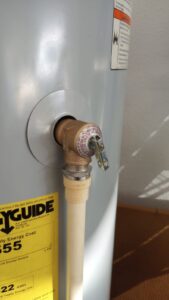
The Impact of Poor Water Quality
Water is essential for our daily lives, from hydrating our bodies to performing household tasks. However, the quality of the water we use can have a significant impact on various aspects of our well-being and the condition of our homes.
Health Risks: Your health is paramount, and poor water quality can jeopardize it. Contaminants in water can lead to a range of health issues, from gastrointestinal problems to more severe conditions. Learn how addressing water quality can safeguard your family’s well-being.
Appliance Damage: Your household appliances are not immune to the effects of poor water quality. Mineral deposits and sediment can wreak havoc on your washing machine, dishwasher, and water heater. Discover how water quality issues can cut the lifespan of your appliances short and how to prevent it.
Plumbing Problems: Your plumbing system bears the brunt of poor water quality. Corrosion and clogs can lead to expensive repairs or replacements. We’ll delve into how subpar water quality can corrode pipes and impact your plumbing, and what you can do to prevent it.
Aesthetic Issues: Beyond health and functionality, poor water quality can affect the aesthetics of your home. Stains on dishes, fixtures, and even clothing can be the result of water quality issues. We’ll explore how these aesthetic problems can be linked to water quality and what you can do to restore the beauty of your home.
Testing Your Water: DIY Kits vs. Professional Water Testing
Ensuring the quality of the water that flows through your home is crucial for your health and the well-being of your household. Testing your water is the first step in identifying any potential issues and making informed decisions about water treatment. In this article, we’ll explore two primary methods of testing your water: DIY testing kits and professional water testing.
DIY Testing Kits
1. Convenience: DIY water testing kits are readily available and can be purchased at local hardware stores or online. They are designed to be user-friendly, allowing homeowners to collect water samples easily.
2. Affordability: DIY kits are often more cost-effective than professional testing services. They provide a budget-friendly option for those who want to get a basic understanding of their water quality.
3. Speed: DIY kits typically offer quick results. You can have a snapshot of your water quality within a short timeframe, which is useful for immediate concerns.
4. Ease of Use: DIY kits come with clear instructions, making them accessible to anyone, even without prior testing experience.
Professional Water Testing
1. Accuracy: Professional water testing services are conducted by trained experts using specialized equipment. They provide the highest level of accuracy and reliability in assessing water quality.
2. Comprehensive Analysis: Professional testing can detect a wide range of contaminants, including those that DIY kits might miss. This comprehensive analysis ensures a thorough understanding of your water quality.
3. Customized Solutions: If issues are identified, professionals can provide tailored recommendations and solutions to address specific water quality problems.
4. Legal Compliance: In some cases, such as real estate transactions or regulatory requirements, professional testing may be mandatory to ensure legal compliance.
Choosing the Right Method
The choice between DIY testing kits and professional water testing depends on your specific needs and circumstances. Here’s how to decide:
- DIY Testing Kits: If you’re looking for a quick and affordable way to get a basic understanding of your water quality and have no immediate concerns, a DIY kit might be suitable.
- Professional Water Testing: If you have specific concerns, want a comprehensive analysis, or need to meet regulatory requirements, professional testing is the best choice. It offers the highest level of accuracy and expert guidance.
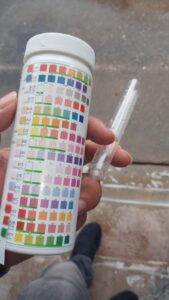
Enhancing Water Quality: Your Guide to Effective Solutions
When it comes to water quality, having the right solutions in place can make all the difference. In this blog, we’ll explore a range of water quality improvement solutions, each designed to address specific issues and ensure that you and your family have access to clean, safe water.
Whole-House Filtration Systems
Whole-house filtration systems are comprehensive water treatment solutions that are installed at the point where water enters your home. These systems are designed to filter and remove a wide range of contaminants, including sediments, chemicals, and impurities, from all the water that flows into your house. They provide clean and safe water for various uses, including drinking, bathing, cleaning, and cooking, at every water outlet in your home.
Benefits:
- Comprehensive filtration for your entire home.
- Removes sediments, chemicals, and contaminants.
- Improves the taste and odor of your water.
- Protects plumbing fixtures and appliances.
Ideal For:
- Homes with multiple water outlets.
- Those seeking a one-stop solution for all water quality issues.
- Areas with hard water or high sediment levels.
Water Softeners
Water softeners are devices or systems that are specifically designed to address the issue of hard water. Hard water contains high levels of minerals, primarily calcium and magnesium, which can lead to limescale buildup on plumbing fixtures and appliances. Water softeners work by removing or exchanging these minerals with sodium or potassium ions, making the water “soft.” Soft water not only prevents scale buildup but also improves the efficiency and longevity of water-using appliances and makes soap and detergents more effective.
Benefits:
- Eliminates hard water problems.
- Reduces limescale buildup on fixtures and appliances.
- Extends the lifespan of water-using appliances.
- Makes cleaning and laundry more efficient.
Ideal For:
- Homes with hard water issues.
- Those looking to prolong the life of appliances.
- People want to enjoy the benefits of soft water.
Reverse Osmosis Systems
Reverse osmosis (RO) systems are advanced water filtration systems that use a semipermeable membrane to remove a wide range of contaminants from drinking water. These systems force water through the membrane, which allows water molecules to pass while blocking the majority of impurities, including chemicals, minerals, and microorganisms. RO systems are highly effective in producing clean, great-tasting drinking water and are often installed under the kitchen sink for point-of-use treatment.
Benefits:
- Advanced filtration for drinking water.
- Removes up to 99% of contaminants.
- Provides clean, great-tasting water at the tap.
- Compact and easy to install.
Ideal For:
- Ensuring high-quality drinking water.
- Removing a wide range of impurities.
- Small households or those with limited space.
UV Water Purification
UV (ultraviolet) water purification systems use ultraviolet light to disinfect and sterilize water by deactivating or killing harmful microorganisms, such as bacteria, viruses, and parasites. These systems expose the water to UV-C light, which disrupts the DNA of microorganisms, rendering them unable to reproduce or cause illness. UV water purification is a chemical-free and environmentally friendly method commonly used for treating well water or water sources prone to microbial contamination.
Benefits:
- Kills harmful microorganisms in the water.
- Ensures safe drinking water.
- Low maintenance and environmentally friendly.
- Ideal for homes with well water or known bacterial issues.
Ideal For:
- Homes with well water.
- Areas with known bacteria or microbial contaminants.
- Ensuring the highest level of water safety.
Point-of-Use Filters
Point-of-use (POU) filters are water filtration systems that are installed at specific water outlets, such as faucets or showers, to target and remove specific contaminants or improve the taste and quality of water at that location. These filters come in various forms, including faucet-mounted filters, showerhead filters, and under-sink filters. POU filters are designed for localized water treatment and are suitable for addressing specific concerns like chlorine taste and odor, sediment, or lead in drinking water.
Benefits:
- Targeted filtration at specific water outlets.
- Removes contaminants for drinking and cooking.
- Enhances the taste and quality of water.
- Easy to install and maintain.
Ideal For:
- Customized water quality solutions.
- Improving water quality at selected points.
- Cost-effective filtration for specific needs.
Which water filtration system is best for removing specific contaminants?
The choice of the best water filtration system for removing specific contaminants depends on the type of contaminants you need to address. Different filtration methods are more effective at removing certain contaminants. Here are some common water contaminants and the filtration systems best suited for each:
Sediment and Particles:
Filtration System: Sediment Filters or Whole-House Filtration Systems
Description: Sediment filters are designed to capture and remove solid particles, such as sand, silt, rust, and sediment, from the water. They are commonly used as pre-filters in whole-house systems to protect plumbing and appliances from damage.
Chlorine and Chloramines:
- Filtration System: Activated Carbon Filters or Whole-House Filtration Systems
- Description: Activated carbon filters effectively remove chlorine, chloramines, and their associated tastes and odors from water. They are often used in point-of-use filters, like faucet-mounted or pitcher filters, as well as whole-house systems.
Heavy Metals (e.g., Lead, Mercury, Arsenic):
- Filtration System: Reverse Osmosis (RO) Systems
- Description: RO systems use a semipermeable membrane to remove a wide range of contaminants, including heavy metals. They are highly effective at providing purified drinking water free from these harmful substances.
Microorganisms (e.g., Bacteria, Viruses):
- Filtration System: UV Water Purification Systems or Point-of-Use Filters with Microbial Filtration
- Description: UV water purification systems use ultraviolet light to kill bacteria and viruses, providing safe drinking water. Some point-of-use filters are specifically designed to target and remove microbial contaminants.
Hard Water (Calcium and Magnesium):
- Filtration System: Water Softeners
- Description: Water softeners use ion exchange to remove calcium and magnesium ions, effectively “softening” the water. They prevent scale buildup on fixtures and appliances caused by hard water.
Nitrates and Nitrites:
- Filtration System: Reverse Osmosis (RO) Systems or Anion Exchange Filters
- Description: RO systems can remove nitrates and nitrites, and anion exchange filters are also effective at reducing these contaminants.
Volatile Organic Compounds (VOCs):
- Filtration System: Activated Carbon Filters or Whole-House Filtration Systems
- Description: Activated carbon filters excel at removing VOCs from water, making it taste and smell better. Whole-house systems with activated carbon can address VOCs throughout your home.
It’s important to note that the effectiveness of a filtration system depends on factors like the specific contaminants in your water, the system’s design and capacity, and the flow rate. Before choosing a filtration system, it’s advisable to have your water tested to identify the contaminants present. This will help you select the most appropriate system to address your specific water quality concerns.
Preserving Water Quality: A Shared Responsibility for Health and Sustainability
In this comprehensive blog, we’ve unveiled the secrets to achieving pristine water quality in your home. From understanding the significance of water quality to identifying common issues, testing methods, and choosing the right water treatment solutions, you now have the knowledge to take control of your water quality.
Plumbing Therapist is your trusted partner in this journey. Our team of expert plumbers is ready to assess your water quality needs, recommend tailored solutions, and provide ongoing maintenance to ensure your water stays clean and safe for your family.
Don’t let water quality issues disrupt your daily life or jeopardize your health. Take action today, and remember that the Plumbing Therapist is here to keep your water flowing pure and clear.

